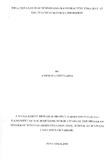| dc.description.abstract | The current study sought to achieve the following objectives; to establish the implementation
process of performance contract at the Teachers Service Commission, to establish the challenges
faced in the implementation and to determine the perceptions of the employees of the
implementation process.
To achieve the aim of the study the researcher used a case study in which the Teachers Service
Commission was the unit of study and also incorporated a descriptive survey to determine the
perceptions of employee. Data was collected using interview guide and structured questionnaire.
The questionnaires were dropped and later picked. The researcher carried out analysis using
both content analysis and descriptive statistics using the frequencies, percentages and the tables
to represent results.
The study established that TSC is on track in the implementation of performance contract
process and this has been made possible by a number of factors. These were; the TSC supportive
structure which has defined reporting procedures, well defined communication channels,
departmental structures has enabled the commission to break up activities making them
manageable. There is a specific section of Policy, Planning and Research which is mandated to
facilitate the implementation process. Other factors include good leadership, the setting of clear,
realistic and measurable goals, the policies & procedures, the use of Performance Appraisal &
Monitoring and Evaluation team and good coordination and sharing of responsibilities.
In implementating performance contracts, it was however found out that the commission faces a
number of challenges. The challenges pointed out were inadequate financial resources, shortage
of staff, lack of relevant skills, lack of commitment, lack of teamwork, untimely release of funds,
untimely budget approvals, lack of computers and resistance to change.
The study also shows that there are other shortcomings in the implementation process which
have led to ineffective and negatively perceived process by the employees. These include; lack
of involvement of all the employees in the setting of targets, majority of employees have not
been trained on performance contracting concept, Monitoring & Evaluation and Performance
Appraisal systems are ineffective and lastly the reward/sanction policy has not been implemented
at the TSC.
The study also recommends that the TSC requires to successfully implement the performance
contracts and therefore needs to consider its resources, employees skills/knowledge, effective
Monitoring & Evaluation systems among others as this may have brought about poor ratings in
the implementation of performance in the Performance Evaluation of public Agencies reports
over the years.
The study also recommends that future studies in this area should replicate the study in other
industries to establish their implementation practices, challenges and employee perception to
establish whether the results found therein hold. | en |

